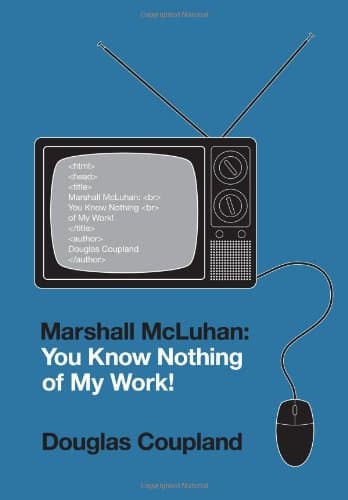Noah Brier | March 8, 2022
The Media Probe Edition
On theory, predictions, and technology
Recommended Products

A biography of Marshall McLuhan, exploring the most intellectually electric period of his life, his perspectives on technology, society, and the impact of technology on society.
Noah here. As has been well-documented at this point, I’m a big McLuhan fan. I find myself turning to his writing and thinking when I need to get out of an intellectual rut. Recently, I re-read parts of his 1969 Playboy interview and was struck by his response to a question about whether he thought we were turning too much of our future agency over to technology.
First of all—and I’m sorry to have to repeat this disclaimer——I’m not advocating anything; I’m merely probing and predicting trends. Even if I opposed them or thought them disastrous, I couldn’t stop them, so why waste my time lamenting? As Carlyle said of author Margaret Fuller after she remarked, “I accept the Universe”: “She’d better.” I see no possibility of a worldwide Luddite rebellion that will smash all machinery to bits, so we might as well sit back and see what is happening and what will happen to us in a cybernetic world. Resenting a new technology will not halt its progress.
Why is this interesting?
First off, it’s always fun to read McLuhan explaining his style as probing. It’s long been my belief that part of why he’s so hard to read/listen to is he was just screwing around with people and the medium. Probing them. It doesn’t necessarily make it any easier to get through, but at least it offers a bit of context.
Second, it’s interesting to see McLuhan push back against the idea that he was a booster of technology just because he wrote so much about it. This is obviously something we’ve seen pop up over the last decade. What I didn’t realize about McLuhan, however, was how concerned he really was about the impact of technology on society. Here’s a bit from Douglas Coupland’s out-of-print biography of McLuhan:
The late 1950s were probably the most intellectually electric period of Marshall’s life. New ideas crackled around his head like Tesla waves. Society was absorbing too much technology too quickly, and he knew it. Did he like this? No! He hated, loathed, abhorred it. There was a small window in the late 1950s when he had a drop of hope that the world might become a better place with new technology—but that hope quickly died with the decade. As of the 1960s, Marshall viewed the mortal world as a lost cause because of both pollution and technology, and he pined for another era, a different time stream, a different universe—anything different from booming North America’s guns- and-butter praxis. How the man ever came to be perceived as technology’s cheerleader is a mystery. Not that any of this stopped McLuhan on his quest for ideas.
McLuhan was super religious, and the argument Coupland lays out, which jibes pretty well with that Playboy quote, is that he stuffed all those feelings inside him in order to explore (probe) the world of media more effectively. Part of what makes him so readable today is that his books aren’t full of predictions that never came true or strongly worded moral warnings about the downfall of society. On one hand, you can read a lot of what he said as vague enough to be true at any time. But that’s not how I (and lots of others) see it. Rather, to me, he’s still relevant because he was looking at these concepts—media, communication, technology—in their purest sense. (NRB)
--
WITI x McKinsey:
An ongoing partnership where we highlight interesting McKinsey research, writing, and data.
Patients love telehealth—physicians are not so sure. During the pandemic, patients gravitated toward telehealth, especially for behavioral health treatment. But physicians say they are concerned about telehealth’s long-term sustainability. A new article can help you make sense of the disconnect between consumers and providers, and what it means for healthcare’s future.
—
Thanks for reading,
Noah (NRB) & Colin (CJN)
—
Why is this interesting? is a daily email from Noah Brier & Colin Nagy (and friends!) about interesting things. If you’ve enjoyed this edition, please consider forwarding it to a friend. If you’re reading it for the first time, consider subscribing (it’s free!).

